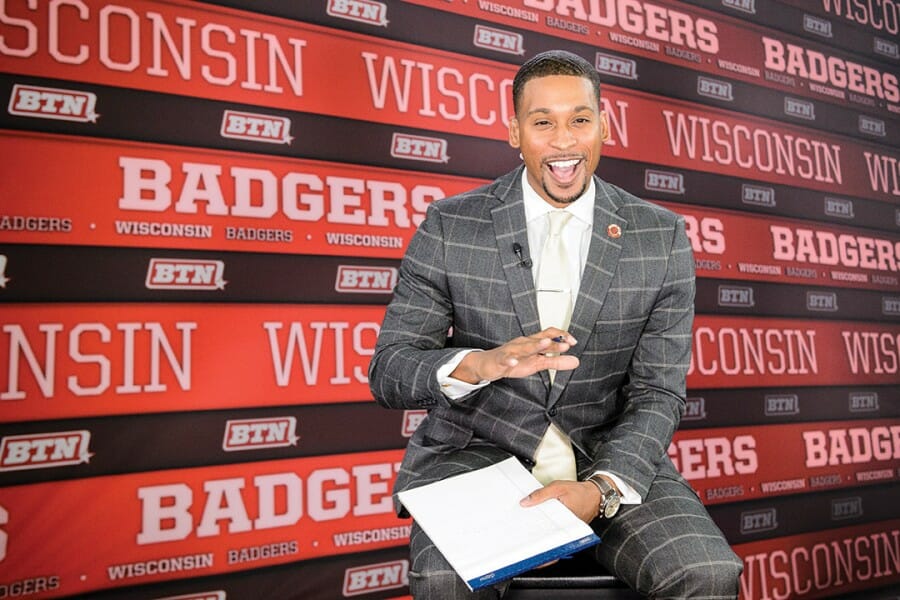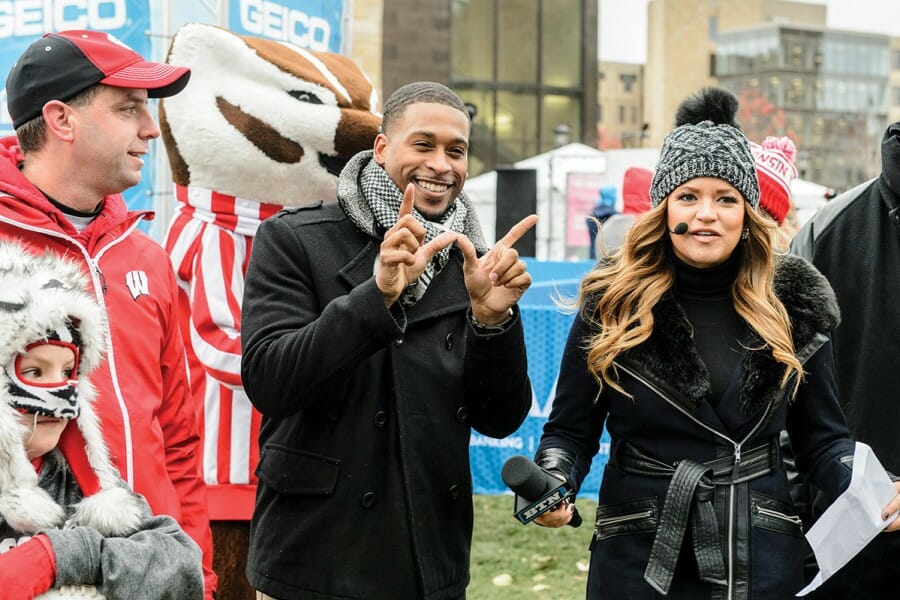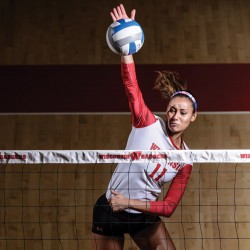A Big Bounce Back
Former Badger wide receiver Brandon Williams reached his NFL dream, but then he lost everything.
Brandon Williams ’16 always knew that his younger brother, Walt Powell, wanted to be like him. Growing up in Saint Louis, the kid — there are seven and a half years between them — followed Williams everywhere, and as the years went by, they stayed close. When ESPN’s live broadcast revealed that Williams, who had starred as a wide receiver at UW–Madison, had been picked by the San Francisco 49ers in the third round of the 2006 NFL draft, 14-year-old Powell ran into the street and shouted the news to the neighborhood.
The story took a fairy-tale turn eight years later, when Powell was drafted by the Arizona Cardinals in 2014. Williams, who had been out of the league for several years by then, was thrilled that his brother would follow him to the NFL. But he was determined that there was one place Powell would never follow him: bankruptcy.
A 2009 Sports Illustrated article noted that “by the time they have been retired for two years, 78 percent of former NFL players have gone bankrupt or are under financial stress because of joblessness or divorce.” Williams was part of the majority. His bankruptcy, in January 2010, while personally devastating, was hardly unique among former professional football players.
In Williams’s case, there was nothing left of a signing bonus that was in the middle six figures after taxes. The houses and cars were gone, too, along with a fiancée and daughter, who moved to the West Coast. Williams hadn’t been truly reckless — but he hadn’t saved, either, and hadn’t foreseen his playing career ending after just three seasons. In the end, he’d had no financial guidance.
He needed the NFL’s help to qualify for an apartment lease in Saint Louis in August 2010, but Williams didn’t draw the curtains and hide. Instead, after a brief moment of soul-searching, he went into a frenzy of activity. He lined up some paid speaking engagements, coached at camps, and reached out to the sports information director at the UW for an introduction to the Big Ten Network. And there was something else.
“After I went through my whole financial ruin,” Williams says, “I got an epiphany. God put something in my heart to say, ‘Look. This should not happen. It’s an epidemic. What are you going to do about it?’ ”
His brother — by then a promising college football player — was on his mind, too.
“I was thinking, ‘I can’t let him down. I can’t let him go through what I went through.’ ”
Williams made a deep dive into the tenets of financial literacy, reading books, scouring the internet, talking to savvy investors, and networking.
“He taught himself about financial literacy,” says Stephen Johnson, a regional president with BMO Private Bank, where Williams was employed as a private wealth adviser in 2016–17, having previously worked for Northwestern Mutual.
His desire to help his brother — and other athletes — navigate the choppy circumstance of being handed a lot of money in a hurry was a powerful motivator.
“I learned a great deal,” Williams says, “about the markets, about how you interact with wealthy people, and how you present things.”
In 2015, Williams self-published a financial guide for athletes called Millionaire Mindset, and since 2010, he has worked as a studio analyst for football on the Big Ten Network. He has lived with his wife, b. Marcell Williams ’08, in Madison since 2015, when he moved back to finish his UW–Madison degree. They have four children between them.
Williams left BMO — on good terms — in summer 2017, and he now works as a consultant for InitiativeOne, a leadership-training company based in Green Bay. The new role takes Williams beyond finance into all aspects of leadership development and executive coaching. It also allows more flexibility for his broadcasting duties and the increasing demand for his services as a speaker and event host. In October, Williams proved a personable and witty master of ceremonies for the Wisconsin Innovation Awards at the Memorial Union.
Of course, anything Williams does will be buttressed by his hard-earned financial education. He’s given advice to younger brother Powell, who played for the Buffalo Bills after being drafted by the Cardinals and was most recently signed by the Jacksonville Jaguars to their practice squad.
“He was a sixth-round pick [for the Cardinals],” Williams says. “He didn’t get a lot of money. He’s got money now. He’s got real estate, multiunit properties.”
“We talk at least four times a week,” Powell says. “We’ve been doing that since I was in college. He tries to steer me in the right direction.”
Powell continues, “He’s my brother; he’s my best friend; he’s my psychiatrist. He’s a great big brother to have.”
The extended family is big but close, and football has been there at the center, always.
78 percent
of former NFL players experience bankruptcy or other financial stress within two years of retirement
(Sports Illustrated, “How [and Why] Athletes Go Broke” March 23, 2009)
Williams had an uncle and a close family friend who were both high school football coaches in the Saint Louis area, and he started playing youth football when he was seven.
Once he started high school, he worked tirelessly, lifting weights and running passing routes for his uncle, Terrell Davis, now a high school coach in Florida. “[Brandon] had great hands,” Davis says. And by the time Williams was a junior at Hazelwood East in Saint Louis County, people were noticing. It didn’t hurt that his best friend was Hazelwood senior Scott Starks ’11, who was also a gifted athlete who later played in the NFL. They lived near one another and worked out together, sticking to a punishing routine even on hot summer days when their teammates sought air conditioning.
Williams came to the UW on scholarship — as Starks had a year earlier — arriving in Madison on May 26, 2002, the day after he graduated from high school.
“From the moment Brandon Williams arrived on campus,” wrote UW athletics director — and then head football coach — Barry Alvarez in the foreword to Millionaire Mindset, “he showed he was a tough, talented, and confident young man and football player.”
Williams played a lot as a freshman — star Badger receiver Lee Evans III ’14 was hurt in an intrasquad game the previous spring — and never looked back. He ended his career at Wisconsin as the all-time leader in pass receptions with 202 (a record that was subsequently tied by Jared Abbrederis ’13), and he was a standout kick returner as well.
His relatively small size — five-foot-nine inches, 177 pounds — kept Williams from being a first-round NFL pick. But he was confident he would be drafted somewhere, and he hosted a large party for family and friends at his mom’s house in Saint Louis on draft day in April 2006.
Early that day, an aunt called. “When are you going to be drafted?”
“I don’t know,” Williams said.
“What year were you born?” his aunt asked.
“Nineteen eighty-four,” Williams said.
“You will be the 84th player picked,” his aunt said.
She nailed it — Williams went in the third round. “They say you speak it into existence,” he says now, laughing. “She did.”
He was happy to be going to the 49ers — “I loved [49ers legend] Jerry Rice,” Williams says — but in hindsight, he feels the team never gave him a real shot as a receiver. He returned punts. A stomach virus in the off-season made for a slow start the next year, and the 49ers released him after three games.
He ended up back home with the Rams in Saint Louis, even living in his mom’s new house.
“I’d bought the house,” Williams says. “I figured there was a room in there for me somewhere.”
His time with the Rams was unremarkable, and after a failed tryout with the Steelers in 2009, Williams was out of football. He was also out of money. Among his mistakes: a $75,000 investment in a company that went nowhere.
“I invested in some people as well,” Williams says, “who didn’t pan out.”
The bankruptcy filing in January 2010 was a low moment, but by June of that year, Williams had picked himself up and was headed out to New Jersey and something called NFL Broadcasting Boot Camp.
When Williams reached out to Justin Doherty MA’03, who led communications for UW Athletics, Doherty provided an introduction to Quentin Carter, a producer with the Big Ten Network. As a player, Williams did well in interviews, and he hoped to leverage that into a future in broadcasting.
He auditioned in May 2010. “You’re good on camera, but you’re just not ready,” Carter told him. “I can’t put you on TV yet.”
Williams then applied for the four-day immersion broadcasting boot camp course sponsored by the NFL’s Player Engagement office.
Carter, also at the camp, noted Williams’s progress and offered him a Big Ten Network spot. Williams made seven appearances in 2010, and he’s still with the network. He did 27 shows in one year alone and interviewed Alvarez at the Rose Bowl. Williams also did five seasons of pre-game shows for the Rams in Saint Louis.
“He’s knowledgeable, he’s personable, and I think that resonates on TV,” says Carter, who today is vice president for studio production for the Big Ten Network. “People like him. He has a bright future.”
In 2015, Williams moved his family to Madison, enrolled at the UW, and completed his degree in communications. That same year he published Millionaire Mindset.
The chief lesson Williams learned was to surround himself with the right people. “Build your team,” he says. “That’s the first chapter in the book. … If [your main adviser is] your mama, what can she do? Has she run a business or put together a budget or a marketing campaign?”
Williams is now at work on a second book, tentatively titled The IIT Factor of Leadership. IIT stands for intelligence, intangibles, and toughness.
He wants to see people reach their full potential. In his postfootball life, Williams has seen how it can happen, and not happen, and he feels well-positioned now to share those lessons.
As for his own potential, Williams says that a decade from now, he’d love to be “running a firm that is dedicated to executive coaching and leadership transformation.” He grins.
“And also on [ESPN’s] College GameDay.”
Doug Moe’s latest book, Tommy: My Journey of a Lifetime, a collaboration with Tommy Thompson on the former Wisconsin governor’s autobiography, will be published in September by UW Press.
Published in the Spring 2018 issue





Comments
No comments posted yet.